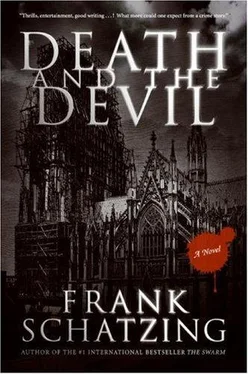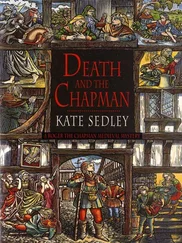“Certainly.”
“You don’t think he was lying? What I mean is, if he isn’t a liar, then Christian charity demands we should help him. But I’m still not sure whether we can trust him. He could be a rogue. I say that just for the sake of argument.”
“Correct. He could be.”
“How should I put it?” Goddert wheezed. “I’ve got a soft heart, and when you gave him something to keep him warm, you probably got that from me. There’s nothing wrong with that, as such—”
“But?”
Goddert put his hands behind his head. The bed frame creaked under his weight. “Well.”
Richmodis smiled and gave his beard a little tug. “You know what I think, Father? Your soft heart tells you to help him. But if you help him, that means you believe him, which means you trust him. And unfortunately there’s no good reason to tell someone you trust not to see your daughter. Only you don’t want to lose her. A nice dilemma, eh?”
“Stuff and nonsense,” Goddert snorted. “Balderdash. Don’t get ideas above your head, missy. That’s neither here nor there. I didn’t say it and I didn’t think it. A beggar, a good-for-nothing, and you from a respectable family. The thought never entered my head.”
“Ha! You’re jealous, like all fathers.”
“Me? Jealous? Pull the other one. Why aren’t you sleeping? Off you go to your bed. Get a move on.”
“I will do what I think fit.”
Offended, Goddert pushed out his lower lip, pulled his blanket tighter around him, and turned to the wall. “Jealous!” he muttered. “Did you ever hear such childish prattle?”
Richmodis gave him a kiss and got back into her warm bed.
After a while the night watchman cried the tenth hour. She heard the clatter of hooves as he passed beneath their window. It was a comforting noise. She drew up her knees and snuggled deeper under the blanket.
“Richmodis?”
Aha.
“Do you like the lad?”
She giggled, thumbed her nose mentally at Goddert, and wrapped her arms tightly around her.
The tenth hour had passed.
Johann was kneeling at the little altar, trying to pray. He looked over to the wide bed where Hadewig would normally be sleeping. Today she was keeping the death watch with Guda Morart. His wife knew nothing of the alliance, none of their wives knew. She had no idea that he, who had received Gerhard in his house, as had the Kones and many other patrician families, had given his approval to his murder. She did not even know he had been murdered.
But for how long?
Johann suddenly realized that from the moment they had sealed their alliance, the men had distanced themselves more and more from their families. They had become outsiders in their own homes. He wished he could discuss the affair with Hadewig. He loved her, she loved him, and yet he was alone.
He asked himself what price they would have to pay. Not the price of earthly justice—if everything went well, they would never be found out—but the one their own self-respect would demand. Something inside them would die a little with every excuse they allowed themselves to get away with for their sin against life, the justifications with which they absolved themselves, at the same time recognizing them for the self-deceptions they were. What would be left of them when it was all over?
What would be left of him?
Johann thought of Urquhart out there. He knew as good as nothing about him, no more than the count of Jülich, who had sent him to them. He appeared like a deep red shadow against the gold-leaf background of an age in which things seemed nearer and more familiar the farther apart they were. Tears of courtly love beside streams of blood, the sophistication of the court side by side with the crudity of peasant life, dependent on each other, determining each other. The terrible and the beautiful, two sides of a magic mirror. People passed through from one world to the other—and were still in the same world.
In which world did Urquhart live? Was he hell or did he carry hell within him? People were familiar with death. The passion with which executions were carried out corresponded precisely to the passion that led to murder. But it was the coldness inside Urquhart that both fascinated and repelled Johann because he could find no reason for it, not even the blood money. How many had murdered and slaughtered in the name of their faith? But they did it out of religious fervor, others out of cruelty or the perverse pleasure they took in the sufferings of their victims; there were the robbers who did it for gain, those who hated, and those who loved too much.
And then there were the hired killers, mindless and cruel.
But Urquhart was not mindless. The look in his eyes spoke of cold intelligence. A look so sharp you could cut yourself on it! He had a high, handsome forehead, a soft, cultured voice, almost gentle, with a tone of mild mockery.
Why did he kill?
Johann shook his head. Pointless reflections. He had seen Urquhart just once that morning, when Matthias had brought him to the house, and had spoken briefly to him. Why was he so desperate to find out what made him tick?
Fear, he thought. Fear of asking how far away I am from what Urquhart is. Whether the difference is one of kind or just one of degree.
Fear of finding out how one becomes like him.
Johann raised his right hand to cross himself.
He couldn’t.
The two night watchmen turned their horses out of Saxengasse into Haymarket. They had just called midnight. In an hour the Franciscans, Benedictines, and Carmelites would be getting up for matins, to greet the new day with psalms and listen to readings from the Church fathers. Most of them with their eyes closed and snoring.
“Getting cold,” one said with a yawn.
“You should be glad,” said his comrade. “When it gets cold the thieves stay in the warm, the down-and-outs freeze to death, and the streets are quiet.”
The house entrances passed, solid blocks of darkness.
“Did you hear they found two dead bodies this morning? A whore in Berlich with a bolt through her eye and a man by the Duck Ponds, he had one through the back of his neck. Odd little things they were. Like a crossbow bolt, only somehow too small.”
“So what? Scum.”
“Still.” He shivered. “It’s odd.”
“I’m quite happy if they start cutting each other’s throats. Peace and quiet for us.”
“Sure, but who goes shooting these funny little bolts nobody’s ever seen before? The canon of St. Margaret’s mentioned the Devil. A possibility, don’t you think? Whatever, my parents are so scared they’ve shoved the table up against the door.”
“What’s the point?” The other man gave a harsh laugh. “Let the Devil come. We’ll keep our eyes open.”
The other grunted some kind of agreement. They rode on in silence, across Haymarket and down past the malt mill. The horse in front snorted. The man stroked its mane, muttering quiet words to calm it down, then resumed his sleepy posture, slumped slightly forward.
Urquhart watched them pass.
They had ridden so close by him he could have stretched out a hand to pat the horse’s flanks. His fingers touched the polished wood of his tiny crossbow. It was almost a caress.
Then he set off to check the churches where the homeless slept in the doorways.
“Now I know what we’ve got to do,” said Jaspar, his cheeks bulging with currant porridge.
Jacob was clasping his head.
“What’s the matter?” asked Jaspar. “Ill again?”
“Drunk.”
“Stuff and nonsense. The drink was yesterday. Look outside. The sun’s shining, the Lord has sent us a new day and phenomenal new thoughts into my head, since nothing will grow on top.” He waved his finger impatiently over Jacob’s bowl. “What’s wrong? I get the maid to make us some sweet porridge that would have the emperor himself licking his lips and you sit looking at it as if the currants had legs.”
Читать дальше












